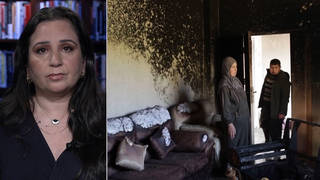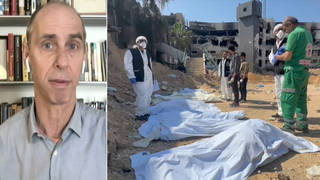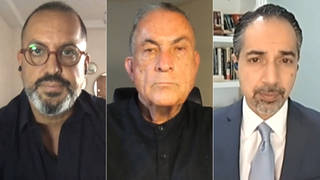
Related
We speak to the Pulitzer Prize-winning reporter Spencer Ackerman about how the U.S. could have ended the War in Afghanistan two decades ago, when the Taliban offered to surrender and hand over Osama bin Laden. “It was the Bush administration, the United States, that said such a deal was unacceptable — not to the Afghans, but unacceptable to the United States, that now took it on itself, as it has so often throughout its history in so many parts of the world, to tell Afghans the way their country was about to be,” Ackerman says.
Transcript
AMY GOODMAN: This is Democracy Now!, democracynow.org, The War and Peace Report. I’m Amy Goodman.
We turn now to look at the roots of what’s become America’s longest war. The U.S. invaded Afghanistan October 7, 2001, less than a month after the al-Qaeda attacks on the World Trade Center and the Pentagon. Within days of the U.S. bombing of Afghanistan, the Taliban offered to hand over Osama bin Laden, the al-Qaeda leader, but the Bush administration rejected any negotiations with the Taliban. This is Bush’s press secretary, Ari Fleischer, responding to a question in October 2001.
REPORTER: Would you go so far as to say that no matter what the Taliban might say at this point, it may not make any difference? Are you ignoring whatever they may say?
PRESS SECRETARY ARI FLEISCHER: The president could not have made it any clearer two weeks ago when he said that there will be no discussions and no negotiations. So, what they say is not as important as what they do. And it’s time for them to act. It’s been time for them to act.
AMY GOODMAN: In December of 2001, just a month or two later, the Taliban offered to surrender control of Kandahar, if its leader, Mullah Mohammed Omar, would be allowed to, quote, “live in dignity” in opposition custody. U.S. Defense Secretary Donald Rumsfeld rejected the offer.
DEFENSE SECRETARY DONALD RUMSFELD: If you’re asking would an arrangement with Omar where he could, quote, “live in dignity” in the Kandahar area or some place in Afghanistan be consistent with what I have said, the answer is, no, it would not be consistent with what I have said.
AMY GOODMAN: That’s Donald Rumsfeld speaking December 6, 2001. The U.S. War in Afghanistan would continue for almost 20 more years through to now. According to the Costs of War Project, the U.S. has spent over $2.2 trillion in Afghanistan and Pakistan. By one count, at least 71,000 Afghan and Pakistani civilians have died in the fighting. Afghanistan is now facing a massive humanitarian crisis, and the Taliban is back in power.
Well, today we’re spending the hour with the Pulitzer Prize-winning reporter Spencer Ackerman, author of the new book Reign of Terror: How the 9/11 Era Destabilized America and Produced Trump. The book is based in part on his reporting from Afghanistan, Iraq and Guantánamo.
Talk about this moment as the U.S. began bombing and occupying Afghanistan, when the Taliban basically said they would surrender and also give Osama bin Laden over. The U.S. rejected. President Bush rejected both.
SPENCER ACKERMAN: This was a central aspect of the war on terror at its inception and a foreshadowing of what its implications would be. Once we accept the frame that Bush offered — war on terror — we were then locked into a struggle not just against al-Qaeda, the entity culpable for the 9/11 attacks, but a much broader struggle against an enemy that a president could redefine at will and leave in the popular imagination with something along the lines of a civilizational challenge to America for the future, one in which America itself was in the balance.
Now, let’s look, in particular, at that moment in Kandahar. The United States’s Northern Alliance allies had routed the Taliban from Kabul. The Islamic Emirate of Afghanistan had fallen, after about five, six years in power, and they recognized, after a last stand they tried to put on in Kandahar didn’t go the way they expected, that the end was near for them. And then they offered to Hamid Karzai, the U.S.’s appointed leader for a post-Taliban Afghanistan, that as long as Mullah Omar could live in some kind of house arrest, basically not be killed, not be put up on trial, they were prepared to entertain negotiations for what their role might be in a post-Taliban Afghanistan — basically, a political settlement at that point.
Karzai, for all his flaws that the United States would both contribute to and then criticize him for over the coming years, nevertheless knew Afghan history and recognized that unless there was some kind of political future for the Taliban, the Taliban would opt for a violent future. And they had a proven capacity not just to wage an insurgency, but to triumph in one. And Karzai took the deal.
It was the Bush administration, the United States, that said such a deal was unacceptable — not to the Afghans, but unacceptable to the United States, that now took it on itself, as it has so often throughout its history in so many parts of the world, to tell Afghans the way their country was about to be. And everything that happened since, the 20 years of war since, has contributed on, if not quite a straight line, a kind of nausea-inducing glide path to the abject horror we’re seeing at the Kabul airport with people desperate to flee, desperate to — so desperate as to grab onto C-17 cargo planes and fall to their deaths. This is not the alternative to fighting in Afghanistan; this is the result of fighting in Afghanistan.
AMY GOODMAN: So, if you could take it back even farther, to the U.S.-backed mujahideen, to the U.S.-backed Osama bin Laden, and talk about what happened when the U.S. decided to fund the mujahideen in fighting against the Soviet occupation of Afghanistan, and then the mujahideen turning their — setting, literally, their gun sights, their U.S. weapons, on the United States, and how the Taliban came out of that?
SPENCER ACKERMAN: Yeah, it’s important, because, like, an objection to this is always going to be that we, you know, portrayed, like, the 1980s Afghan mujahideen as the Taliban. They weren’t the Taliban. They were the precursors of the Taliban.
What happened in the 1980s is the Soviet Union invaded Afghanistan, and the United States saw an opportunity. It saw an opportunity to inflict upon the Soviet Union, its great geopolitical adversary, a defeat as humiliating and as psychologically devastating as the one the United States suffered in Vietnam for its own imperial hubris. Over the course of the next 10 years, the United States, the Pakistani ISI and the Saudi intelligence services funded and equipped Islamic extremists, rebels who would come in from Pakistan — among them, a figure who would become intimately familiar as a Taliban ally, Gulbuddin Hekmatyar, a particularly brutal person. And over the course of the 1980s, they inflicted tremendous damage on the Soviets, made the occupation, which was a brutal occupation by the Soviet Union, ever more violent and ever more protracted, to the point where the Soviets withdrew and, a couple years later, the regime the Soviets installed collapsed, much as like we’re seeing the one that the United States installed collapsed.
The ensuing chaos and civil war was devastating for Afghanistan. Out of the ashes emerged the Taliban, an extreme group, a group that, you know, used mechanisms of extreme suffering and repression on the long-suffering Afghan people. And something that the United States never recognized throughout this entire period was that it had destabilized Afghanistan, not simply as a pawn of — not simply as a consequence of fighting the Soviet Union, but that was what the cost of fighting the Soviet Union was, that an entire country, millions of people, suffered tremendously, that they were treated as tools by the United States, that their aspirations, their desires for freedom, their desires for security ultimately didn’t matter to the United States, much as they didn’t matter to the Soviet Union. And in the chaos that resulted, the Taliban took power. They sheltered Osama bin Laden.
But they weren’t the same thing as al-Qaeda. And the United States, after 9/11, decided that there was no relevant distinction between al-Qaeda, between the Taliban and between what it called “terrorist groups of global reach,” which ultimately washes out to saying that while the respectable version of the Bush administration’s policies were already an extremely expansive conception of who could be targeted, moving from terror groups like al-Qaeda to, ultimately, entire regimes — the deputy defense secretary, Paul Wolfowitz, spoke in the immediate aftermath of 9/11 about “ending states” — but in the broader political, journalistic and then popular conception, the enemy could be all of Islam, or it could be something just short of all of Islam. And from there, it was an extremely short, rather immediate, transition to fearing American Muslims, fearing your neighbors, thinking your neighbors posed a threat to you — not that this apparatus of war and repression posed a threat to you.
AMY GOODMAN: You know, Spencer, one of the things that hasn’t gotten reported very much is that as the Taliban seized control in these last weeks of Afghanistan, a key person that they executed — he was imprisoned, and they executed him — was Abu Omar Khorasani, the former head of the Islamic State in South Asia. The significance of this?
SPENCER ACKERMAN: Yeah, this is an extreme complication that has come up in the last couple years of particularly U.S.-Taliban negotiations, by which I mostly mean back-channel negotiations. I shouldn’t say “back-channel.” To be a little bit more specific, they weren’t authorized before they were authorized. It was somewhat of a freelance effort by a retired U.S. Army colonel named Chris Kolenda and a retired U.S. ambassador to Pakistan named Robin Raphel.
What they discovered in their talks with Taliban figures in Doha was that the Taliban were rather concerned about the rising presence of a so-called Islamic State branch in Afghanistan, what called itself, or the U.S. also called it, ISIS Khorasan, or IS Khorasan. Essentially, the Taliban feared a kind of next generation of extremist entity insurgency using Islamic justification inside Afghanistan — and with somewhat, I think it’s fair to say, good reason, given the way that ISIS fought and displaced al-Qaeda, the organization and entity that it emerged out of, as well.
AMY GOODMAN: And again, they killed him. They executed him, took him out of a prison in Kabul on that final day, Sunday, as they took control of the country. Spencer Ackerman, talk about the role the U.S. war and occupation, the brutality of the U.S. airstrikes, the torture at Bagram, the night raids played in gaining new recruits for the Taliban.
SPENCER ACKERMAN: The United States tends not to attribute its brutality to any of the circumstances that it comes to bemoan when they manifest in the world. And Afghanistan is certainly a tragic example of that. The fact that, after 9/11, the United States, in its political and journalistic and intellectual elites, generally speaking, refused to accept that there was a direct and tragic and awful historic consequence of its destabilization of Afghanistan in the 1980s, to the degree that Taliban facilitation of Osama bin Laden in the country helped the execution of the 9/11 plot — which, it’s important to note, did not involve Afghans and was not staged from Afghanistan, nor was it even planned in Afghanistan; it was far more planned in Germany. Nevertheless, that was an early foreboding of what we would see over the next 20 years, not just in Afghanistan, but throughout the war on terror: a disconnection, an unwillingness to face that America’s violent and imperial actions breed their own next generation of enemies. That was on display once the United States went back into Afghanistan.
And throughout the Afghanistan War, even during periods where counterinsurgency campaigns, at least on paper, paid lip service to the idea that protecting Afghan lives and property and so forth was going to ultimately be decisive in the war, it never acted that way. It never acted as if what the point of the war was was the protection of Afghan lives. It more often acted in such a way that it did not draw distinctions between Afghan lives and Afghan enemies. And amongst the major reasons for this is not necessarily like a specific decision to target Afghan civilians, but an inability to understand the country, understand its dynamics and understand the rather complicated relationships, in many ways, between people who fight for the Taliban and the Taliban itself, or people who aid the Taliban under threat to their own life or threat to their family, or simply seek to endure the war, as so many people throughout so many wars simply aspire to, simply by not taking action that harmed the Taliban, because they understood the consequences that could — that they could experience. Over time, all of these things strengthened the Taliban, made the Taliban seem like, once again, a viable alternative to the United States.
And then, on a different level, the United States’s contribution — and not just the United States alone’s contribution — to the misery in Afghanistan came through the corruption that it always blamed on the Afghans but was a significant driver of itself, so-called development experts. Development aid and development money poured into Afghanistan far beyond a consideration of what a devastated Afghan economy could in fact absorb. And some of this money was very deliberately flooded in from the CIA to pay off warlords to ensure that they would ultimately be responsive to American interests, which would often be violent interests, which would often be things like, as the Joint Special Operations Command would perform throughout the Afghanistan War, Army Special Forces, in particular, throughout the Afghanistan War, raids on people’s houses suspected of being, aiding or facilitating the Taliban — and again, the Taliban, not even al-Qaeda, not the thing that attacked the United States, certainly not the core of al-Qaeda that plotted, planned and executed 9/11. The United States was now in extended war with a one-time harborer, ally of al-Qaeda rather than the thing itself, responsible for all of Afghanistan, but never acting responsibly toward the Afghan people.
AMY GOODMAN: I want to go to January 2015. This is the Obama years. Two hostages — one American, one Italian man — were accidentally killed by a U.S. drone strike along the Afghan-Pakistani border. Here’s then-President Obama later apologizing for the killings.
PRESIDENT BARACK OBAMA: This morning, I want to express our grief and condolences to the families of two hostages: one American, Dr. Warren Weinstein, and an Italian, Giovanni Lo Porto, who were tragically killed in a U.S. counterterrorism operation. … Since 9/11, our counterterrorism efforts have prevented terrorist attacks and saved innocent lives, both here in America and around the world. And that determination to protect innocent life only makes the loss of these two men especially painful for all of us.
AMY GOODMAN: So, there you have President Obama apologizing. Spencer, you have spent a good amount of time in Afghanistan. You were embedded there, and then you also reported independently there. Can you talk about the significance of this moment?
SPENCER ACKERMAN: This was a profound moment. This is the only time that the United States, particularly the president of the United States, has not only acknowledged drone strikes that killed civilians, but apologized for it. And the reason why it’s such a significant moment in its singularity is — both in the book and for an earlier series that I did for The Guardian in 2016, I interviewed people, Pakistanis and Yemenis principally, who were survivors of drone strikes or whose relatives were killed in drone strikes. And one of the stories I tell in Reign of Terror is from a young Pakistani man named Faheem Qureshi.
Faheem Qureshi was 13 years old when Obama launched his first drone strike. And it blew up Faheem’s compound, where he lived with his family. And they were gathering for a celebration of one of his relatives who had just returned from a successful business trip to the United Arab Emirates. Forty days later, Faheem woke from his coma. He had burns over most of his body. He was missing an eye. And he had learned that most of his family’s breadwinners had been killed in the strike, so that when he left the hospital, his responsibilities would immediately be providing for his family, however it was that his mangled body would perform.
And I talked to him about the difficulties he experienced throughout the, you know, next, at that point, about seven years. And among the things he discussed was that he had tried, through Pakistani authorities and through the U.S. Embassy, to get some kind of acknowledgment that what had happened to him had in fact happened, and that it didn’t just happen as an act of God, it happened as an act by the United States of America. And none of that ever came. What did come was a supply of blood money, essentially, a payoff essentially to say, like, “OK, this is what will count for restitution, and your account is settled, and you’re not going to get any public acknowledgment, let alone an apology.”
And I kept hearing, when I interviewed people — not just Faheem, but other people whose lives were changed irrevocably by drone strikes — about how Obama had apologized when he had killed white people, and never when he had killed people like them, never when he had killed their loved ones, never when the consequences of his actions had left someone maimed, had left someone in a position where he had to give up his dream of being a chemist and work however he could in the hope that, as he had put it to me, some of his younger cousins and his brothers would be able to live happy and prosperous lives. And I asked him, “What do you think of Barack Obama?” And he said, “If there’s a list of tyrants somewhere, Barack Obama’s name is on it because of his drone strikes.”
AMY GOODMAN: Spencer Ackerman, we’re going to break and then come back. Spencer is author of Reign of Terror: How the 9/11 Era Destabilized America and Produced Trump. He’s a national security reporter who publishes the Forever Wars newsletter.












Media Options